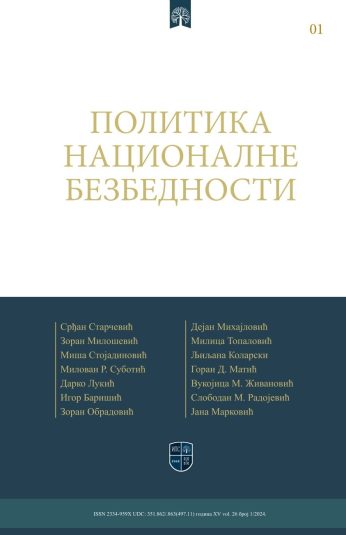ARTICLES AND STUDIES
RELEVANCE OF MEDIA IN THE FUNCTION OF REAFFIRMATION OF SECURITY CULTURE IN NATIONAL SECURITY POLICY
Abstract
The subject of this paper is to research correlations and causalities between the individual perception and security consciousness and higher forms of collective security, such as national security, while taking into consideration both general and specific aspects that affect both individual and national security. In this theoretical research, we have used methods of analysis, structural and functional; synthesis; descriptive method; and normative method – applied to respective subsections that we covered to meet the goals of this paper – to properly determine the factors that affect the security consciousness of individuals, so they will be able to properly perform their roles in the system and the policy of national security; to determine the importance of these individual factors, and then, in the results section, to give specific recommendations to each link in the determined chain of responsibility in creation and maintenance of the necessary level of security consciousness. In determining the factors, we undertook a broad approach, starting from determining the dominant cultural paradigm, which is illustrative of the zeitgeist and dynamics of human relations, and at the same time, it represents a framework where social events take place, including security events as well. We further described the specificity and potential of mass media within the shift of the dominant cultural paradigm, first in general, and then in the context of this paper’s subject. As human motivation directly depends on the level of fulfillment of human needs, we reviewed existing theories of human motivation and the role of safety and security within them and concluded that the safety needs are in fact on the same level as the most basic human needs, meaning that not even the most basic human needs cannot be adequately fulfilled if the safety needs are not met. Furthermore, after determining the importance of the security culture awareness and consciousness of individuals for security and safety on all levels, we gave elaborated recommendations for introducing security culture into the Republic of Serbia’s education system. In the end, we analyzed the current Strategy of National Security of the Republic of Serbia as a framework for productive life and work of people, through a prism of the elements that comprise the subject of this paper, while having in mind the specificity of the security situation in the Republic of Serbia, due to the events from the past (wars in the region, the secession of a part of the territory, economic transition and crises, migrant crisis, etc.). We have concluded this paper with remarks about the importance of reaffirmation of security culture in the Serbian society, citing various reasons that make it the optimal mechanism for raising and sustaining the level of security awareness and culture in all the elements of the chain of security, of which the individuals are most important since they are both the subject and the object of any security strategy and policy.
References

